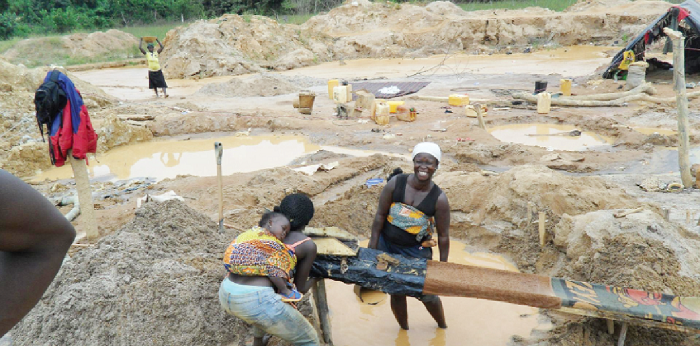
Safeguarding mining investments
Perceptions about the role of mining in developing economies raise critical issues.
For a mining bedded economy such as Ghana’s, the contradictions are sometimes all too evident.
Advertisement
There is contradiction as the State seeks to milk more from a mining industry, yet is seemingly unwilling to tackle the challenges that confront the industry.
We see the intriguing contradiction of mining communities seeing wealth leave their land, yet enveloped in thick veils of poverty; the contradiction of a heavily taxed mining industry still considered a fat cow and sinister ‘tax evader’.
Statements by some senior government officials suggest a deep dissatisfaction with the contributions of the mining sector to Ghana’s economic fortunes.
Addressing the chiefs and the people of the Essikado Traditional Area in the Western Region to climax this year’s Kuntum Festival last Saturday, the Vice-President, Dr Mahamudu Bawumia, gave an assurance that the government was working around the clock to ensure that communities, and by extension the entire country, got maximum returns from the extraction of its mineral resources.
Mining continues to be the number one contributor to the Ghana Revenue Authority’s (GRA’s) direct domestic tax revenue.
Data from the GRA indicate that from 2010 to 2017, mining and quarrying contributed, on the average, 19 per cent to direct domestic tax revenue annually.
Additionally, mining is a major source of forex for the country, accounting for about 40 per cent of merchandise forex receipts in the same period.
Again, mining companies continue to return a large share of their proceeds from the sale of minerals into the country.
According to the Ghana Chamber of Mines, mining companies returned $7.5 billion out of $10 billion, representing 75 per cent, of mineral revenue through the Bank of Ghana and the commercial banks from 2015 to 2017.
Apart from a proportion of mineral royalties that the government is supposed to return to host communities, as stipulated by the Minerals and Mining Amendment Act, 2010 (Act 794), mining companies continue to provide community sustainable development projects in their host communities.
For us at the Daily Graphic, much as we welcome the government’s efforts to maximise mining returns to host communities, we are also concerned about the opaque and troubled utilisation of mining royalties paid by mining companies.
Our concern is that the nine per cent royalties paid by mining companies, which is expected to be used for the development of mining communities, is not properly accounted for.
The utilisation of this money after it has been paid to the State is hidden from the masses and not utilised for its intended purpose.
For instance, between 2011 and 2013, $854,407,800 million was ploughed back into seven mining districts but there was no commensurate development.
At the heart of the challenge is the absence of a Minerals Management Revenue Act which will make the government more responsible in the utilisation of mining revenue.
One pressing challenge the country faces is how to sustain the gains that have been made partly as a result of investment in the past.
Cote d’Ivoire and Burkina Faso, two of the country’s neighbours, have embarked on an aggressive pursuit for mining investment. Their strength, unlike Ghana, is that they do not tax exploration.
The Daily Graphic is worried that the high taxes imposed on mining companies may give our neighbours some edge and ultimately impact negatively on the ability of the mining industry in Ghana to attract more foreign direct investment.
It is, therefore, our view that before any talk of getting maximum benefits from mining is considered, proper audit of how mining royalties are utilised should be done.



